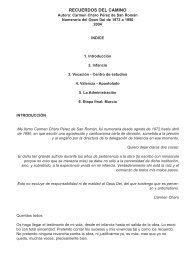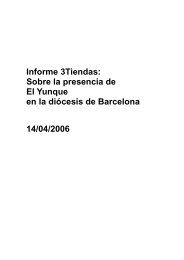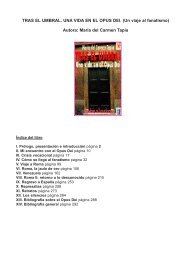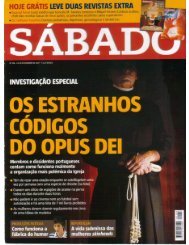eceive in the fraternal chat: only a complete harmony between both kinds of advice ensures the adequatespiritual direction of the persons of the Work (pg. 41). Isn’t it shocking that, in matters of sanctification,the exercise of the ministerial priesthood should be subjected to the directives of “lay Directors” who,according to the norms of Canon Law, can never hold the sacra potestas of the Prelate or his Vicarsand, at most, can only collaborate with it (cooperari possunt: see CIC-83 c. 129)?Another text confirms that things are done this way. Regarding economic issues, the Experienciasde las labores apostólicas (Experiences about apostolic works) of 2003 say: 3 The local Councilshandle these issues with particular diligence, and are vigilant —through the fraternal chat— to ensurethat the persons involved behave at all times as fathers of a large and poor family: in the remunerationfor their professional activities and in their detachment, care, and moderation in the use of thematerial means that they need to carry out their work: offices, cars, trips, etc. Specifically, they makeall understand that freedom in professional activities should always be closely united to a full and effectivedetachment from material goods, and to an unconditional dedication without any reservations.(pg. 68). Note that the good purpose of government is sought through the fraternal chat (personalspiritual direction), as if spiritual direction were a tool to achieve institutional objectives with greatereffectiveness.Is it ecclesiastically acceptable that the most delicate means of spiritual direction is regarded as an“instrument” to ensure the efficacy of governmental directives, no matter how good these might be? Isthis perhaps the way the Church understands how its sacra potestas is placed to the service of eachperson? Obviously not. It is also obvious that if spiritual direction in <strong>Opus</strong> <strong>Dei</strong> were to be separatedfrom government —as it should be— the confusion that facilitates this instrumental “manipulation”would become impossible.3.2 The government of spiritual direction over the immediate subjects7. In full agreement with all the above, according to the praxis of <strong>Opus</strong> <strong>Dei</strong>, personal spiritual directionalways belongs to the Director over his/her own immediate subjects. The 7th edition of 2003 of theCatecismo de la Obra (Catechism of <strong>Opus</strong> <strong>Dei</strong>) says literally: 4 Personal spiritual direction as regardsinterior dispositions is exercised by the Directors and the priests of the Work (number 215). And inthe Vademécum del Gobierno Local (Local Government Vademecum) of 2002, for example, thefollowing is specified: 5 Generally speaking, the fraternal chats of the members of the local Council aretaken care of —as those of the other persons attached to the Center— in the Center itself. In each casethe local Council ponders and decides the most suitable distribution of fraternal chats (pg. 98). Theprinciple of freedom in matters of spiritual direction and sacramental confession, protected by canon630 of the current Latin Code, is seriously harmed by this peculiar “self-reserving” by the Directors ofthe task of spiritual direction over their immediate subjects and, even more, because the reserving ofthis task is based on the government position.For this reason, the new Experiencias de los Consejos Locales (Local Council’s Experiences)dated as of 2005 (pages 84–89) have been swift in camouflaging the real behavior of the Prelature, byrewriting entirely the wording of 2002, so that, read literally, it does not reveal so clearly the habitualabuses perpetrated by its usual pastoral practices. However, all the faithful of the Prelature —or allthose who have belonged to it for a long time— know that the true internal reality is the one heredescribed.3.3 The institutional bureaucratization of spiritual direction8. “Spiritual direction” then becomes another “bureaucratic” task, that is, a matter and task ofthe “institutional organization” of <strong>Opus</strong> <strong>Dei</strong>. This is shamelessly acknowledged when it is taught3 The original Spanish text reads as follows: Los Consejos locales tramitan estos asuntos con especial diligencia,y velan —a través de la charla fraterna— para que los interesados actúen en todo momento como padres de familianumerosa y pobre: en el rendimiento económico de su actividad profesional y en el desprendimiento; cuidado y sobriedaden el uso de los medios materiales que necesitan para el desempeño de su trabajo: oficinas, automóviles, viajes, etc.Concretamente, hacen comprender a todos que la libertad en la actividad profesional va siempre muy unida al pleno yefectivo desprendimiento de los bienes materiales, a una entrega sin reservas ni condiciones (p. 68).4 The original Spanish text reads as follows: Ejercen la dirección espiritual personal en cuanto a las disposicionesinteriores, los Directores y los sacerdotes de la Obra (número 215).5 The original Spanish text reads as follows: En general, las charlas fraternas de las personas del consejo local seatienden —como las de las demás personas adscritas al Centro— en el propio Centro; en cada caso el Consejo localpondera y decide la distribición que considere más conveniente (p. 98).5
and practiced that the directors —when dealing with their superiors— are exempted from the sacrednatural duty of confidentiality about anything discussed inside the “fraternal chats” they receive. Thisviolation of intimacy perverts what should be a “personal” spiritual direction. This is perhaps one ofthe gravest and strongest issues, one generating the gravest abuses and damaging most gravely the mostbasic respect due to consciences, as proclaimed by the teachings of the Church and protected by hercanonical praxis.The Vademécum del Gobierno Local (Local Government Vademecum) of 2002 is quite eloquent: 6Those matters known because of one’s government position are only communicated or discussed, as itis logical, with those who —also because of their government position— should know about them. Ifa medical doctor or a lawyer keep a natural professional secret —professional silence 7 — about thosematters they get to know because of their work, those dedicated to tasks of direction or spiritual formationof souls should live this silence for a much greater reason (pg. 14). That is to say, reasoning a sensucontrario, it is stated that they can discuss all these confidential matters “with those who should knowthem because of their government position.” And who are they? The higher directors.Indeed, it is thus explained in the book on Experiencias sobre el modo de llevar charlasfraternas (Experiences on how to receive fraternal chats) of 2001, where we read: 8 Therefore, accordingto the nature of the fraternal chat, professional silence forbids dealing with these matters with any personsother than those who can and should intervene in spiritual direction, in a line of command that goesfrom the local directors to the Father. Within this line, in ascending order (from below up), professionalsilence is not harmed when the consultation is necessary or advisable (pg. 110). These texts speak forthemselves and do not require any comment.In case the matter had not been made clear enough, the just-quoted paragraph includes a clarifyingfootnote stating: 9 If one understands that <strong>Opus</strong> <strong>Dei</strong> is the one giving spiritual direction, it is easy torealize that it would make no sense, for example, that when making the fraternal chat somebody wereto place as a condition to discuss a specific matter, that the person receiving it would promise “notto tell anybody” about what the person making it was going to divulge; or that the person receiving it,thinking that in this way he/she would facilitate the other’s sincerity, were to mistakenly tell him/her:“do not worry and tell me everything, because I will not tell anybody.” In these hypothetical situations,the person receiving the chat would cease to be an instrument to bring the help of the Work: thatconversation would no longer be a fraternal chat of spiritual direction. Is it clear enough? Is it possibleto concieve a greater distortion of what spiritual direction has always been in the Church?9. This approach, presented with an appearance of goodness, is radically opposed to the Catholicteaching about the respect owed to the consciences of people; and it is also opposed to the currentnorms of universal Canon Law, which should be applied and respected in the personal Prelature. It isenough to think of canons 220 and 240 §2 in the context of canon 984, to realize that no exceptions orexemptions are possible.It is perhaps for this reason that, in this matter of confidentiality, number 222 of the Catecismode la Obra (Catechism of <strong>Opus</strong> <strong>Dei</strong>) states the correct doctrine of the Church. But, as we have seen,other documents “reserved” to a few promote and justify an entirely unacceptable praxis, such as that6 The original Spanish text reads as follows: Las materias conocidad por razón del cargo, sólo se comunican o comentan,como es lógico, con aquellas personas que —también por razón de su cargo— deben conocerlas. Si un médico o un abogadoguardan un natural secreto profesional —secreto de oficio— sobre los asuntos que conocen con motivo de su trabajo, conmucha mayor razón han de vivir ese silencio quienes se ocupan de las tareas de dirección o de formación espiritual delas almas (p. 14).7 Translator’s Note: <strong>Opus</strong> <strong>Dei</strong>’s Founder coined a bizarre terminology, saying that —since he found any secrecyabhorrent— he preferred to call silencio de oficio —which I render in English as professional silence, to make it barelyunderstandable to English speaking readers— what is usually called the keeping of a secreto profesional, that is, of aprofessional secret. The interpretation of this studied avoidance of the word “secret” by the Founder of an institutionsystematically based on secrecy must be left as a future task for deep psychology.8 The original Spanish text reads as follows: Por tanto, de acuerdo con la naturaleza de la charla fraterna, el silenciode oficio prohíbe tratar esos asuntos con cualquier persona fuera de aquéllas que puedan y deban intervenir en la direcciónespiritual, en la línea que va desde los Directores locales hasta el Padre. Dentro de esa línea, y en sentido ascendente(de abajo hacia arriba), no se lesiona el silencio de oficio cuando la consulta es necesaria o conveniente (p. 110).9 The original Spanish text reads as follows: Si se entiende bien que quien imparte la dirección espiritual es el <strong>Opus</strong><strong>Dei</strong>, fácilmente se comprende que no tendría sentido, por ejemplo, que al hacer la charla fraterna alguien pusiera comocondición, para tratar un tema determinado, que quien la reciba se comprometiera a “no contar a nadie” lo que va adecirle; o que este último, pensando facilitarle la sinceridad, equivocadamente dijera al que hace la charla: “Cuéntamelotodo y no te preocupes, porque no se lo voy a decir a nadie más”. En esos casos hipotéticos, la persona que recibiera lacharla dejaría de ser instrumento para hacer llegar la ayuda de la Obra: esa conversación no sería una charla fraternade dirección espiritual.6


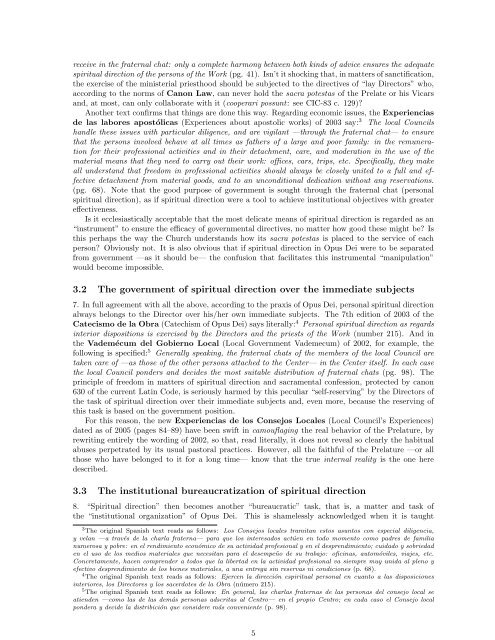
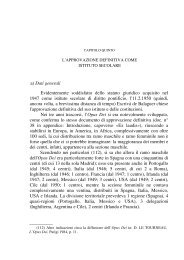
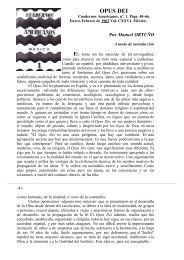
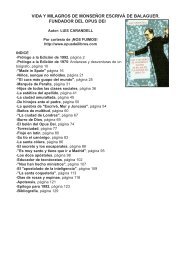
![Opus Dei Anexo A Una Historia [pdf].](https://img.yumpu.com/14295645/1/184x260/opus-dei-anexo-a-una-historia-pdf.jpg?quality=85)

